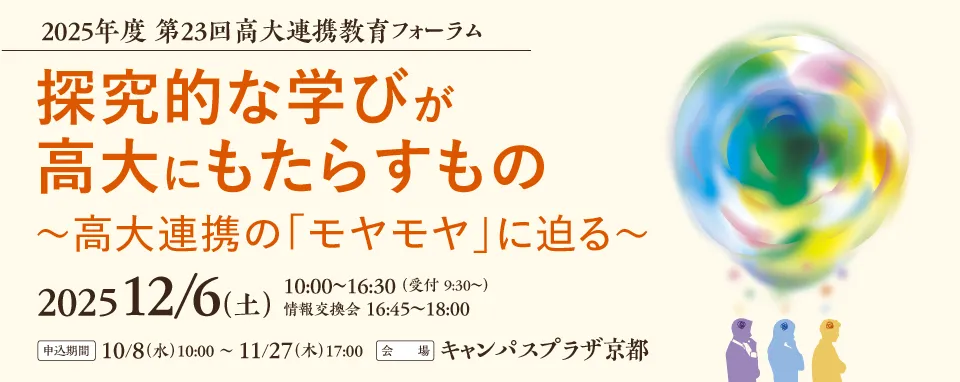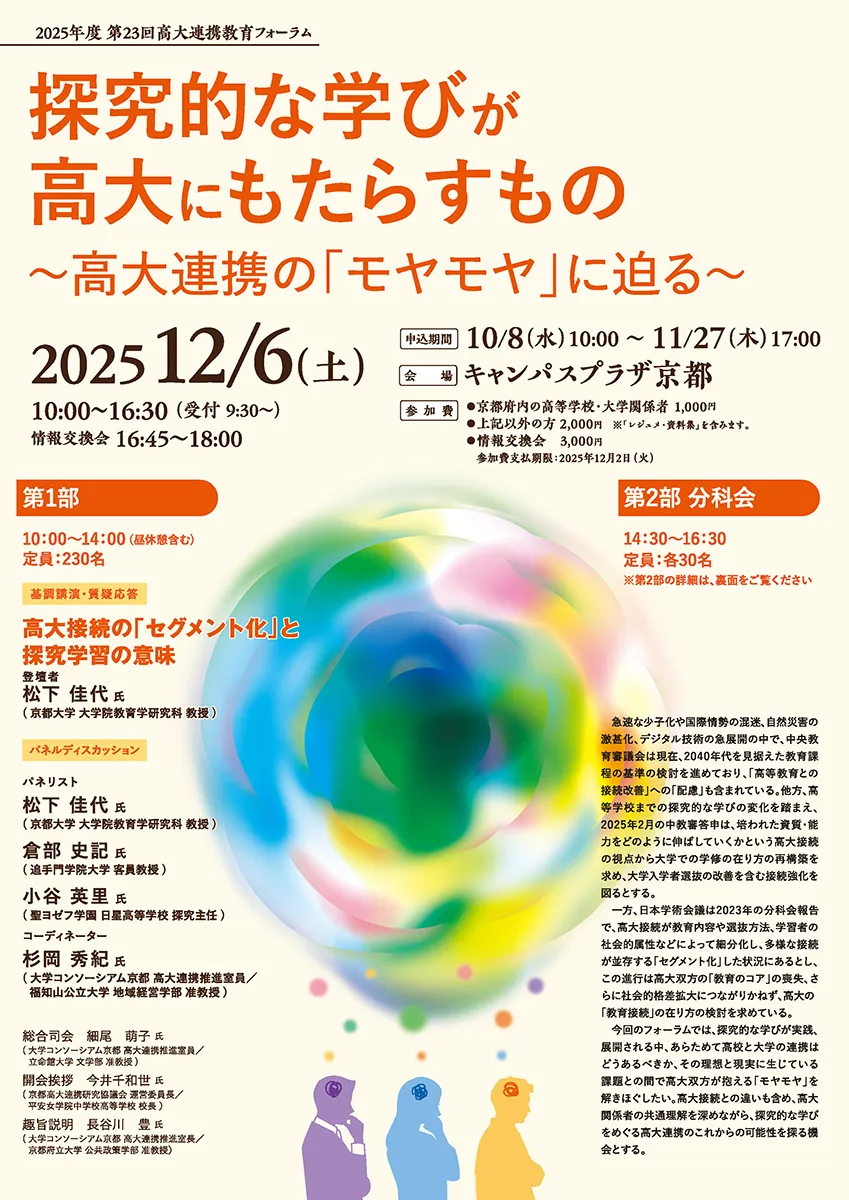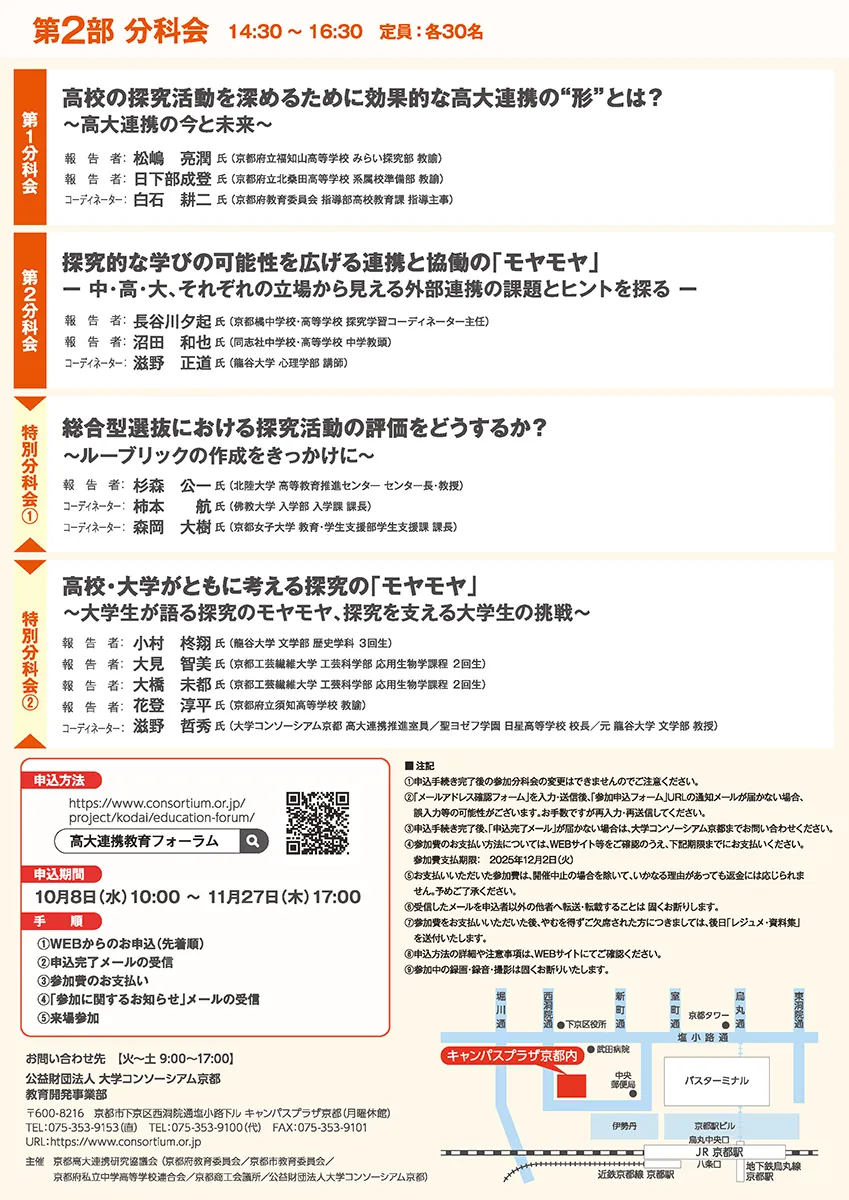사업 개요
고교·대학 간의 제휴·접속 교육 문제에 있어서의 「국내 동향의 정보 공유와 교토에서의 대처의 정보 발신」을 목적으로 포럼을 실시하고 있습니다.
개최 개요
제23회 고대협력교육포럼

급속한 저출산화와 국제정세의 혼미, 자연재해의 격진화, 디지털 기술의 급전 속에서 중앙교육심의회는 현재 2040년대를 내다본 교육과정의 기준 검토를 추진하고 있으며 ‘고등교육과의 연결 개선’에 대한 ‘배려’도 포함되어 있다. 한편 고등학교까지의 탐구적인 배움의 변화를 바탕으로 2025년 2월 중교심답신은 길러진 자질·능력을 어떻게 늘려가는가 하는 고대 접속의 관점에서 대학에서의 학수의 본연의 재구축을 요구하고 대학 입학자 선발의 개선을 포함한 접속 강화를 도모한다고 한다.
한편, 일본학술회의는 2023년 분과회 보고에서 고대 접속이 교육내용이나 선발방법, 학습자의 사회적 속성 등에 따라 세분화하여 다양한 접속이 병존하는 ‘세그먼트화’한 상황에 있다고 하며, 이 진행은 고대 쌍방의 ‘교육의 핵심’의 상실, 더욱 사회적 격차 확대로 이어질 수 있다.
이번 포럼에서는, 탐구적인 배움이 실천, 전개되는 가운데, 다시 고등학교와 대학의 제휴는 어떠해야 하는가, 그 이상과 현실에 생기고 있는 과제 사이에 고대 쌍방이 안는 「모야모야」를 풀어 싶다. 고대 접속과의 차이를 포함해 고대 관계자의 공통 이해를 깊게 하면서, 탐구적인 배움을 둘러싼 고대 연계의 앞으로의 가능성을 탐구할 기회로 한다.
| 일정 | 2025년 12월 6일(토) | ||
| 회장 | 캠퍼스 플라자 교토 | ||
| 테마 | 탐구적인 배움이 고대에 가져오는 것 ~고대 제휴의 「모야모야」에 다가오는~ |
||
| 정원 (선착순) |
제1부 | 기조 강연, 질의 응답, 패널 토론 | 230명 |
| 제2부 | 제1분과회 | 30명 | |
| 제2분과회 | 30명 | ||
| 특별 분과회 1 ※정원을 증 프레임했습니다. | 40명 | ||
| 특별 분과회 2 | 30명 | ||
| 정보교환회 | 60명 | ||
| 참가비 | 제1부 및 제2부 |
교토 부내의 고등학교·대학 관계자 | 1,000엔 |
| 상기 이외의 분 | 2,000엔 | ||
| ※「레주메・자료집」「보고집」을 포함합니다. | |||
| 정보교환회 | 캠퍼스 플라자 교토 홀에서 실시하는 정보 교환회에 참가하시는 분은 오른쪽 금액을 사전에 지불해 주세요. |
3,000엔 | |
| 주최 | 교토 고대 연계 연구 협의회(교토부 교육위원회/교토시 교육위원회/교토부 사립 중학교 고등학교 연합회/교토 상공 회의소/공익 재단법인 대학 컨소시엄 교토) | ||
제23회 고대 제휴 교육 포럼의 전단지는 이쪽으로부터 다운로드할 수 있습니다.
【제1부】10:00~14:00 기조 강연, 질의 응답, 패널 토론
종합 사회
호소오 모코씨(대학 컨소시엄 교토 고대 제휴 추진실원/립명관 대학 문학부 준 교수)
개회 인사
이마이 치와세 씨(교토 고대 연계 연구 협의회 운영 위원장/헤이안 여학원 중학교 고등학교 교장)
취지 설명
하세가와 토요 씨(대학 컨소시엄 교토 고대 제휴 추진 실장/교토 부립 대학 공공 정책 학부 준 교수)
|
기조 강연 1 10:15~11:15 질의응답 |
고대 접속의 「세그먼트화」와 탐구 학습의 의미
|
|
| 종래, 고대 접속의 논의에서는, 2개의 교육 단계가 이질인 것을 전제로, 양자를 어떻게 연결하는가가 과제로 되어 있었다. 하지만 현재는 ‘고등학교의 대학화’ ‘대학의 고등학교’가 진행되어 양자의 이질성보다 오히려 각 세그먼트 간의 차이가 확대되고 있는 것처럼 보인다. 이 상황에서 탐구 학습은 어떤 의미를 가지는 것일까. 본 강연에서는, 몇개의 사례를 들으면서, 세그먼트화가 진행되는 고대 접속의 상황과 거기에서의 탐구 학습의 의미에 대해 논하고 싶다. | ||
| 11:30~13:00 | 점심 휴식 | |
| 13:00~14:00 | 패널 토론 | |
|
패널리스트 마츠시타 요시로 씨 (교토 대학 대학원 교육학 연구과 교수 ) 패널리스트 쿠라베 사키 씨 (추수문 학원 대학 객원 교수) 패널리스트 오타니 에리리 (성 요제프 학원 닛세이 고등학교 탐구 주임) 코디네이터 스기오카 히데키 고대 연계 추진 실원/후쿠치야마 공립 대학 지역 경영 학부 준 교수) |
||
【제2부】14:30~16:30 분과회
| 제1분과회 | 고등학교의 탐구 활동을 깊게 하기 위해서 효과적인 고대 제휴의 “형”이란? ~고대 제휴의 지금과 미래~
보고자
마츠시마 료준 씨(교토 부립 후쿠치야마 고등학교 미라이 탐구부 교사) 히시타부 나리토 씨(교토 부립 기타쿠와타 고등학교 계속교 준비부 교사) 코디네이터 |
|
|
본 분과회에서는, 2교에 의한 실천 보고를 통해 고대 연계의 가능성을 생각한다. 후쿠치야마 고등학교는 문리과학과의 탐구활동 ‘미라이학’에서 대학 등에서의 연구를 추구한 활동 속에서 연구를 “학문적으로 깊게” 하기 위해 효과적인 고대연계의 형태를 모색하고 있다. 그 성과와 과제를 보고한다. 기타쿠와타 고등학교는 「모리노 교토」를 교재화한 탐구 학습에 재구축하는 과정에서의 고대 연계의 대처를 통해, 내년도 계속 고등학교로서 스타트하는 키타쿠와타 고등학교가 생각하는 고대 연계의 본연의 자세에 대해 보고한다. |
||
| 제2분과회 | 탐구적인 배움의 가능성을 넓히는 제휴와 협동의 「모야모야」 -중·고·대, 각각의 입장에서 보이는 외부 연계의 과제와 힌트를 찾는다-
보고자
하세가와 유키 씨(교토 타치바나 중학교·고등학교 탐구 학습 코디네이터 주임) 누마타 카즈야 씨(동지사 중학교·고등학교 중학 교두) 코디네이터 |
|
| 중·고·대의 삼자가, 각각의 입장으로부터 탐구적인 배움을 진행하는 가운데 직면하는, 외부와의 제휴나 협동을 코디네이트 할 때의 「모야모야」를 공유한다. 수업 운영의 궁리와 과제, 외부 제휴에 있어서의 역할과 지속성, 월경적인 협동의 본연의 자세에 대해 시점을 제시해, 플로어와도 논의를 깊게 한다. 최종적으로는, 각각의 현장에서 살릴 수 있는 구체적인 힌트나 방책을 가지고 돌아갈 수 있는 세션을 목표로 한다. | ||
| 특별 분과회 ① | 종합형 선발에 있어서의 탐구 활동의 평가를 어떻게 할까? ~루브릭의 작성을 계기로~
보고자
스기모리 코이치씨(호쿠리쿠 대학 고등 교육 추진 센터 센터장·교수) 코디네이터 |
|
| 탐구적인 배우기로 자란 자질·능력을 대학에서 어떻게 늘릴 것인가를 재검토해, 고대 접속의 강화와 입학자 선발의 개선이 요구되고 있다. 분과회에서는 대학 교육으로의 원활한 이행을 목표로 평가의 의의와 루브릭의 필요성 작성에 대해 논의한다. | ||
| 특별 분과회② | 고등학교·대학이 함께 생각하는 탐구의 “모야모야” ~대학생이 말하는 탐구의 모야모야, 탐구를 지지하는 대학생의 도전~
보고자
오무라 柊翔 씨(류야 대학 문학부 역사학과 3회생) 오미 토모미 씨(교토 공예 섬유 대학 공예 과학부 응용 생물 과정 2회생) 오하시 미토 씨 (교토 공예 섬유 대학 공예 과학부 응용 생물 과정 2회생) 하나토 교사) 코디네이터 |
|
| 탐구 학습은 학생이 질문을 만들고 탐구해 나가는 활동이다. 과거의 학교에서는 교원이 학생에게 묻는 스타일이 중심이었지만, 학생이 묻는다는 탐구의 과정은 학생에게도 교원에게도 「모야모야」가 태어난다. 대학생이 자발적으로 고등학교의 탐구학습에 관여하는 사례나 탐구학습을 경험한 대학생의 ‘고등학교 시대의 모야모야’를 공유하고, 탐구의 질을 향상시키기 위해 고등학교, 대학이 할 수 있는 것은 무엇인가를 논의한다. | ||
정보교환회
| 16:45~18:00 |
본 포럼의 회장이 되는 캠퍼스 플라자 교토에 있는 홀에서, 정보 교환회를 개최합니다. 간식과 음료를 준비하고 있으므로, 꼭 참가해 주시도록 부탁드립니다. ※알코올류를 준비하고 있습니다. 학생 쪽은, 접수에서 학생증의 제시를 부탁드리겠습니다. |
|
신청
【주의 사항(반드시 확인해 주세요)】
신청에 대해(선착순)
신청 기간:2025년 10월 8일(수) 10:00~11월 27일(목) 17:00
●사전 신청제. 정원이 되는 대로 종료가 됩니다. 당일의 참가 접수는 실시하고 있지 않으므로, 미리 양해 바랍니다.
●개최 당일의 참가 분과회의 변경은 할 수 없으므로, 주의해 주십시오.
●신청 완료 후, 「신청 접수 완료 메일」을 보내 드리겠습니다. 「신청 접수 완료 메일」이 도착하지 않는 경우는, 귀찮습니다만, 아래와 같이까지 문의해 주세요. 스팸 폴더로 나누어져 있는 경우도 있습니다. 주의해 주십시오.
참가비의 지불에 대해서
참가비 지불 기일:2025년 12월 2일(화)
●지불 방법은, 이하의 ①~③의 방법을 선택해 받을 수 있습니다.
①신용카드 결제 ②편의점 결제 ③계좌이체
※①・②는 메일링형 시스템 「Paysys」를 이용한 결제가 됩니다.
※①신용카드 결제, ②편의점 결제를 선택한 경우는, 지불 방법에 관한 안내를, 페이시스<info@paysys.jp>로부터 메일로 송신합니다.
※③의 계좌 송금에 의한 지불의 경우는, 송금 수수료를 부담해 주시기 때문에 ,미리 양해 바랍니다.
※신용카드 정보는 공익재단법인대학 컨소시엄 교토에서는 보관하지 않습니다.
※결제시스템 운영회사인 주식회사 메타프스페이먼트를 통해 카드회사로 전송됩니다.
●개최 중지의 경우를 제외하고는, 이유의 여하에 관계없이, 참가비의 환불은 하기 어렵기 때문에, 양해 바랍니다.
※사용하시는 브라우저의 쿠키를 「유효」로 설정하지 않은 경우, 신청할 수 없는 경우가 있습니다.
문의처
교토 고대 제휴 연구 협의회 (공익 재단법인 대학 컨소시엄
교토 교육
개발 사업부 고대 제휴 사업 담당)
TEL 075-353-9153 FAX 075-353-9101
〒600-8216
9:00~17:00(연말연시 제외)



















